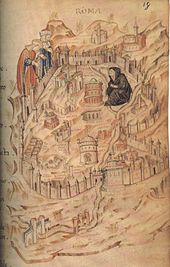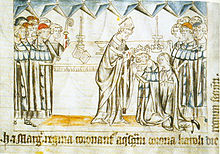1309
Portal history | Portal Biographies | Current events | Annual calendar
◄ |
13th century |
14th century
| 15th century
| ►
◄ |
1270s |
1280s |
1290s |
1300s
| 1310s
| 1320s
| 1330s
| ►
◄◄ |
◄ |
1305 |
1306 |
1307 |
1308 |
1309
| 1310
| 1311
| 1312
| 1313
| ►
| ►►
| 1309 | |
|---|---|
|
Pope Clement V moves the papal seat and the seat of the curia to Avignon . This is the beginning of the so-called " Avignon exile ". |
|
| 1309 in other calendars | |
| Armenian calendar | 757/758 (turn of the year July) |
| Ethiopian calendar | 1301/02 |
| Aztec calendar | 11. Feuerstein - Matlactli ozce Tecpatl (until the end of January / beginning of February 10th tubes - Matlactli Acatl ) |
| Buddhist calendar | 1852/53 (southern Buddhism); 1851/52 (alternative calculation according to Buddhas Parinirvana ) |
| Chinese calendar | 66th (67th) cycle
Year of the Earth-Rooster己酉 ( at the beginning of the year Earth-Monkey 戊申) |
| Chula Sakarat (Siam, Myanmar) / Dai calendar (Vietnam) | 671/672 (turn of the year April) |
| Iranian calendar | 687/688 |
| Islamic calendar | 708/709 (turn of the year 10/11 June) |
| Jewish calendar | 5069/70 (September 5-6) |
| Coptic calendar | 1025/26 |
| Malayalam calendar | 484/485 |
| Seleucid era | Babylon: 1619/20 (turn of the year April)
Syria: 1620/21 (turn of the year October) |
| Spanish era | 1347 |
| Vikram Sambat (Nepalese Calendar) | 1365/66 |
Events
Politics and world events
France and the Avignon Papacy
From this year France will determine the guidelines of papal policy: Pope Clement V , who came from France, relocated the papal seat and the seat of the curia to Avignon in March under pressure from King Philip the Fair . The so -called " Avignon exile " , which lasted until 1376, began . Under French influence, the papacy becomes the plaything of French power interests and loses its authority as a non-partisan power in the Christian West. The persecution of the Knights Templar begins to intensify.
Christian order of knights
The Teutonic Order moves its seat under Grand Master Siegfried von Feuchtwangen from Venice to the Marienburg , a Teutonic Order castle on the Nogat in the Teutonic Order state in the Baltic States and Prussia, which has existed since the middle of the 13th century . The office of Landmeister of Prussia is thus dissolved and combined with that of Grand Master . With the contract of Soldin of September 13th, he acquires from Waldemar , Margrave of Brandenburg , for 10,000 silver marks of Brandenburg weight on the Polish state rights of Władysław I. Ellenlang his disputed claims to the Duchy of Pomerania . The countries around Schlawe , Stolp , Rügenwalde and Bütow go to the Pomeranian aristocratic family of the Swenzonen as the Brandenburg fiefdoms, the larger remainder with the main festival Danzig is taken over by the Teutonic Order.
After more than two years of fighting, the Knights of the Order of St. John , later the Order of Malta , conquered the city of Rhodes under their Grand Master Foulques de Villaret and thus gained control of the island of the same name from the Byzantine Empire, which was allied with Genoese and the Turkish Beylik Mentesche . Soon after, the seat of the Order was moved from Cyprus to Rhodes .
Holy Roman Empire
- January 6 : The end of the previous six electors elected . Henry VII of Luxembourg is in Aachen from Cologne Archbishop Henry II of Virneburg. Crowned Holy Roman king. His wife Margarete von Brabant is crowned with him.
- February 24 : After the death of his father . Bogislaw IV is Wartislaw IV. Duke of Pomerania .
- June: Origin and growth of the Old Confederation : King Heinrich VII of Luxembourg confirms the imperial immediacy of Uri and Schwyz and now also includes Unterwalden ; the three forest sites are subordinate to a royal governor. This privilege is seen today as an important step towards the formation of an alliance later.
- August / September: A farm day is held in Speyer .
- September 17 : Henry VII confirms the Habsburg rulership rights in Speyer in Austria, Styria and Carniola. He condemns the murderers of his predecessor Albrecht I and deprives them of “honor and justice”. The Habsburgs give up their remaining claims to the Kingdom of Bohemia and provide Heinrich with troops and a loan; in return they receive the margraviate of Moravia as a pledge. As a result, they support Heinrich's policy. Heinrich also reached consensual agreements with other greats of the empire such as the Wittelsbachers .
Southern Italy / France
- May 6th : Robert of Anjou , also known as the Wise, becomes King of Naples and Count of Provence after the death of his father Charles II . He is also crowned King of Sicily by the Pope , where his opponent Frederick II of Aragon rules de facto . Over the next few years, Robert became the leader of the anti-Imperial Guelphs .
Iberian Peninsula
- Abu al Juyusch Nasr ben Mohammed sets his older brother Muhammad III. as Emir of Granada and takes over the rule of the Nasrid Empire .
City rights and first documentary mentions
- Spangenberg is granted city rights.
- Courtaman , Dardagny , Oberstocken and Speicher are mentioned for the first time in a document.
science and technology
- The Pont Saint-Esprit , a stone arch bridge over the Rhone , will be completed after 44 years of construction. For a long time it was the only stone bridge between Lyon and the sea and the longest bridge in Europe.
religion
- The Basel cathedral chapter elects Lüthold II von Rötteln as bishop of Basel and thus triggers a long-term dispute with Pope Clemens V , who has already entrusted Gerhard von Wippingen with this office.
- Othon de Champvent succeeds Gerhard von Wippingen, who has been transferred to Basel, Bishop of Lausanne .
- Friedrich I. Spät von Faimingen becomes Bishop of Augsburg .
Born
Date of birth saved
- March 25 : Robert de Ferrers , English nobleman († 1350 )
- June 9 : Ruprecht I , Elector Palatinate († 1390 )
Exact date of birth unknown
- Anna of Lithuania , Queen of Poland († 1339 )
- Firuz Shah Tughluq , Sultan of Delhi († 1388 )
- Guigues VIII. , Dauphin of Viennois († 1333 )
- Johann I , Count of Nassau-Weilburg († 1371 )
- Konrad von Megenberg , universal scholar († 1374 )
- Leon V , King of the Armenian Kingdom of Cilicia († 1341 )
- Tshelpa Künga Dorje , person of Tibetan Buddhism († 1364 )
Born around 1309
- Humphrey de Bohun , English magnate († 1361 )
- Guy Brian , English nobleman, military man and diplomat († 1390 )
Died
Date of death secured
- January 4th : Angela von Foligno , saint of the Roman Catholic Church (* 1248 )
- February 24th : Bogislaw IV , Duke of Pomerania
- March 22nd : Lukardis von Oberweimar , German Cistercian and mystic (* around 1247 )
- April 11th : Jørund , Archbishop of Nidaros (Trondheim)
- May 6 : Charles II , King of Naples (* 1254 )
- May 19 : Augustinus Novellus , Augustinian hermit and Chancellor of King Manfred of Sicily (* around 1240 )
- July 13th : John I , deposed Bishop of Utrecht
- July 16 : James Stewart , High Stewart and Guardian of Scotland (* around 1243 )
- July 26th / 30th : Otto von Grandson , Bishop of Basel
- August 8 : John Lestrange , English nobleman and general (* 1254 )
- August 10 : Giovanni Boccamazza , Bishop and Cardinal
- August 24th : Theobald de Verdon , Anglo-Irish nobleman (* around 1248 )
- November 5 : Gottfried von Hohenlohe , Grand Master of the Teutonic Order (* 1265 )
- November 5th : Magister Jordanus , German cleric and librarian
- November 13th : Luitgard von Tübingen , Countess Palatine of Tübingen (* around 1240 )
- November 27th : Otto IV. , Margrave of Brandenburg (* around 1238 )
- December 9 : Heinrich III. , Polish Herzog (* 1251 / 60 )
Exact date of death unknown
- after October 6th: Friedrich VII. , Count of Zollern
- Elisabeth of Rapperswil , German nobles (* 1251 / 61 )
- Henry III. von Praunheim , Imperial School of the Imperial City of Frankfurt am Main
- James of St. George , Savoy architect in England (* around 1230 )
- Johann II , Count of Dreux (* 1265 )
- Margaret Longespée , English noblewoman (* around 1254 )
- Konrad Sack , Teutonic Knight and Landmaster of Prussia (* around 1250 )
- Rudolf von Wart , German nobleman






